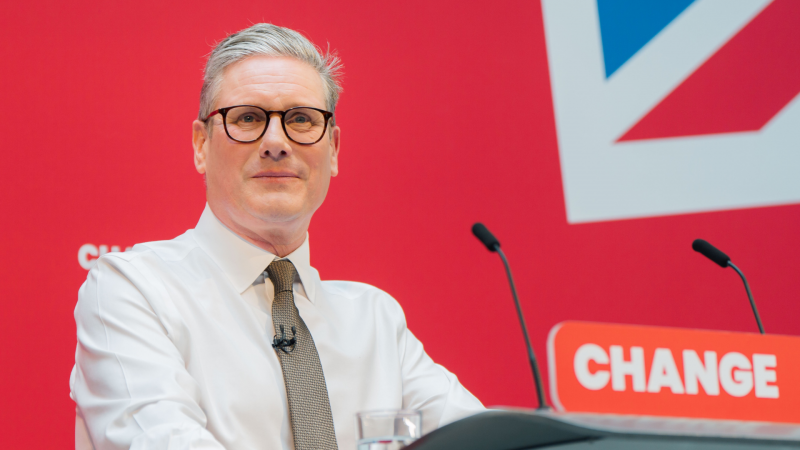
The country is broken. NHS waiting lists spiralling out of control. Energy bills rising so fast they’ve sparked an inflation crisis. Rivers and seas full of sewage. Letters undelivered for days. Buses and trains that never turn up. Essential public services and natural monopolies working for a handful of mostly overseas investors.
Since 2010, we’ve lost at least 200 museums, 244 courts and tribunals, 279 school playing fields, 451 homeless services, 600 police stations, 673 public toilets, 750 youth centres, 793 playgrounds, 800 libraries, 926 football pitches, 1086 swimming pools, 1416 SureStart children’s centres, 8000 bus routes and 25,000 NHS beds. And now, our councils are declaring themselves bankrupt.
Labour’s manifesto says it wants to “turn the page decisively on the Conservative ideas that have caused the chaos”. Promisingly, it suggests a “final and total rejection of the toxic idea that economic growth is gifted from the few to the many”. But then weakly it concludes that the Conservatives have failed to “face the future”.
READ MORE: ‘Labour manifesto shows a new centrism – with the state key to driving growth’
Here’s what has happened. Conservative asset stripping, which began 40 years ago, has been turbocharged in the past 14 years of criminal cuts and privatisation. They have sold off and destroyed precious public institutions, handing out crony contracts while ordinary people suffered. Austerity has killed hundreds of thousands. From backdoor PPE deals to allowing record energy profits, government stole from the people it should have served.
There has never been a better time for Labour to tell the truth and set the stage for the next few terms of government. Alongside an honest political reckoning that gives Labour political space, what is needed is serious investment.
But despite that word being mentioned 59 times in the manifesto, very little is promised to reverse drastic cuts. The promise of a National Wealth Fund is good. But zero investment for taking back assets into public ownership, which would save huge amounts of money on shareholder dividends and debt.
Labour public ownership plans almost feel like an accident
The public ownership that Labour has committed to in this manifesto feels almost like an accident.
Yes, rail franchises will be brought into public ownership as they expire. Yes, buses in public control and ownership, following successful experiments in mayoral regions. Yes, Great British Energy will be a newly created publicly owned company. Yes, the manifesto is right to point out that the Conservative party is ideologically opposed to using the role of the state. But it doesn’t offer a coherent alternative plan from Labour.
“Energy prices have risen faster here than in any other country in Western Europe,” it says.
Because of privatisation. Labour could offer fairer and cheaper bills directly to households by buying back British Gas to provide the retail wing of Great British Energy, for around £1 billion. Publicly owned supply is normal in France, Germany, Italy and the US.
“The national grid has become the single biggest obstacle to the deployment of cheap, clean power generation,” it reads.
Because of privatisation. Even this Conservative government has been forced to quietly nationalise part of National Grid for net zero planning.
“Not a single reservoir has been built in the last 30 years.”
Because of privatisation. £78bn has flowed out of England to mostly overseas investors. Labour could bring the country’s largest water company, Thames Water into public hands for free, making it cheaper and quicker to solve the sewage crisis and putting river action groups on the company board.
“Labour will also explore new business and governance models for Royal Mail.”
Good, because privatisation has failed. Buying back 500-year-old Royal Mail would cost very little for huge economic benefits.
Will Labour still embark on a once-in-a-generation insourcing drive?
The manifesto doesn’t mention “the biggest wave of insourcing in a generation”, settling instead for an attack on “wasteful competitive bidding”, management consultants and clawing back pandemic profits.
And although Labour seems to draw a dividing line between insourcing of contracts (which Labour will sometimes promise) and buying back assets (which Starmer and Reeves don’t want to do) even this distinction is not applied consistently.
94% of private contracts in the NHS come up for renewal in what would be Labour’s first term of office. Yet Wes Streeting hasn’t committed to bringing these back into the NHS, despite the wastefulness of outsourcing and Oxford University linking this policy with unnecessary patient deaths.
Streeting insists on emphasising the role of the private sector, which has itself admitted it can’t fix the problem. Britain’s largest private hospital chain treats in a whole year the same number of patients the NHS treats in just 36 hours.
READ MORE: UK general election poll tracker: Daily roundup on how polls look for Labour
Meanwhile an NHS hospital in Ilford has just opened two new operating theatres for treating only waiting list patients – Labour should promise more of this instead.
The situation is too desperate for a middle-of-the-road offering
The situation is far too desperate for a manifesto intended as a middle-of-the-road offering. If Starmer wants Tony Blair-era levels of growth, with things only getting better, it will take direct investment into the public services that make people and communities healthy. And it won’t make sense to let shareholders keep raking in profits.
If all that requires taxing people with fortunes of £10 million or more, Labour should do it. Stick with wealth creation as a goal and call it a multimillionaire tax or decamill tax.
The country is broken. We know who broke it, who benefited, at whose expense. Country first is right. The issues on the doorstep won’t be solved with regulation, timid amounts of funding and legal tweaks. They require well-funded public services, accountable to the public, working for people not profit.
Otherwise, in 2029, voters in towns like Grimsby will be pointing to the same issues — NHS waiting lists, impossible energy bills, sewage in the rivers, the desperate state of the economy. And Labour’s victory will be short lived.
Socialist Health Association warns Labour under-funding risks NHS ‘decline’

Labour’s caution on tax hikes and borrowing “condemns the NHS to continued fragmentation and decline,”, the party’s affiliated health group has warned.
The Socialist Health Association (SHA) has also voiced concerns about a ‘lack of detail’ in the Labour manifesto on health, but praised some aspects of the policy document.
Labour’s manifesto pledges on health included doubling the number of cancer scanners, training thousands more GPs and midwives and 40,000 more appointments per week to cut waiting times.
Keir Starmer said in his speech launching the manifesto: “We don’t have a magic wand. But what we do have – what this manifesto represents, is a credible long-term plan.
“A plan built on stable foundations, with clear first steps, tough spending rules that will keep taxes and inflation low. NHS waiting times cut – with 40,000 extra appointments every week.”
But an SHA spokesperson said: “The NHS needs investment. There is no way around it. The refusal to raise taxes or borrow combined with the continued commitment to outsourcing condemns the NHS to continued fragmentation and decline.
“It seems from recent research that a high percentage of outsourcing and PFI contracts are due to end during the next five years. We need a commitment to bring this back in house.”
READ MORE: Labour manifesto 2024: What are the party’s NHS and health policies?
The SHA spoke more positively about many of the specific policies in the manifesto, including the pledges to bring down waiting lists, bring in new state-of-the-art scanners, and public health measures to stem rates of smoking, obesity and gambling.
However, other pledges were more luke-warmly received – such as recruiting 8,500 new staff over five years to treat mental health problems in children and adults, which was described as a “very modest proposal”.
They added: “The manifesto is not detailed and is, at times, unclear: is the NHS just a commissioning organisation or is it the provider of healthcare?
“If it buys services from private providers there will be less healthcare to go around because they will take a cut for shareholder profit and they will need to use largely NHS trained staff.
“And we know that the use of outsourced services deepens inequalities.”
READ MORE: ‘The Labour manifesto’s health policies demonstrate little-noticed radicalism’
Chief executive of The King’s Fund Sarah Woolnough also sounded a note of caution.
She said: “New stats released just this morning show the waiting list for planned NHS care has increased on the previous month and now stands at 7.6 million.
“Long waits for care have been brought down before, but it takes time. Labour’s aim to clear the backlog within five years will take real effort and absolute focus, and may mean the big, transformational reforms set out in this manifesto such as healthcare closer to home will be slower to realise.”
Labour was not immediately available for comment.












